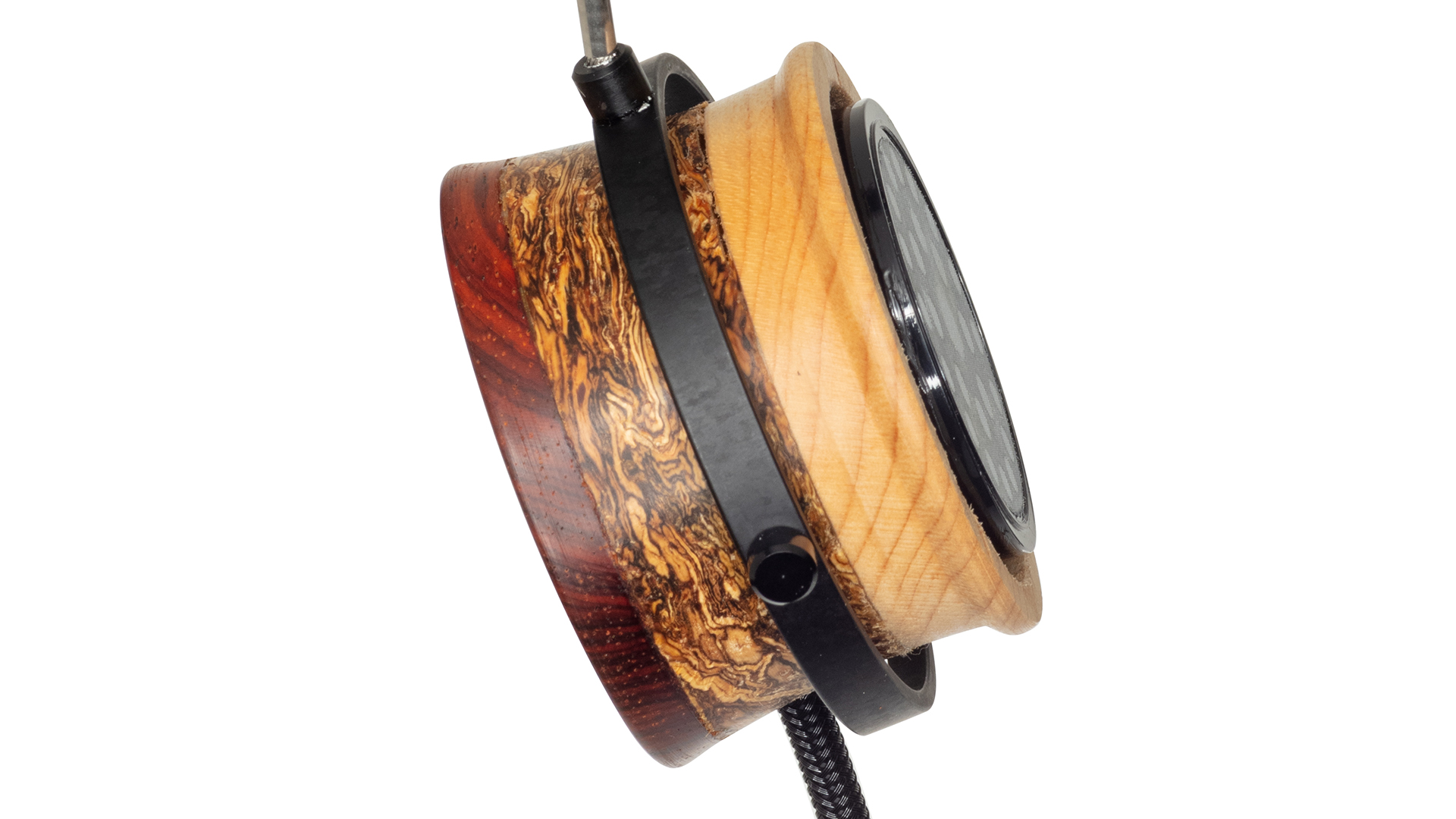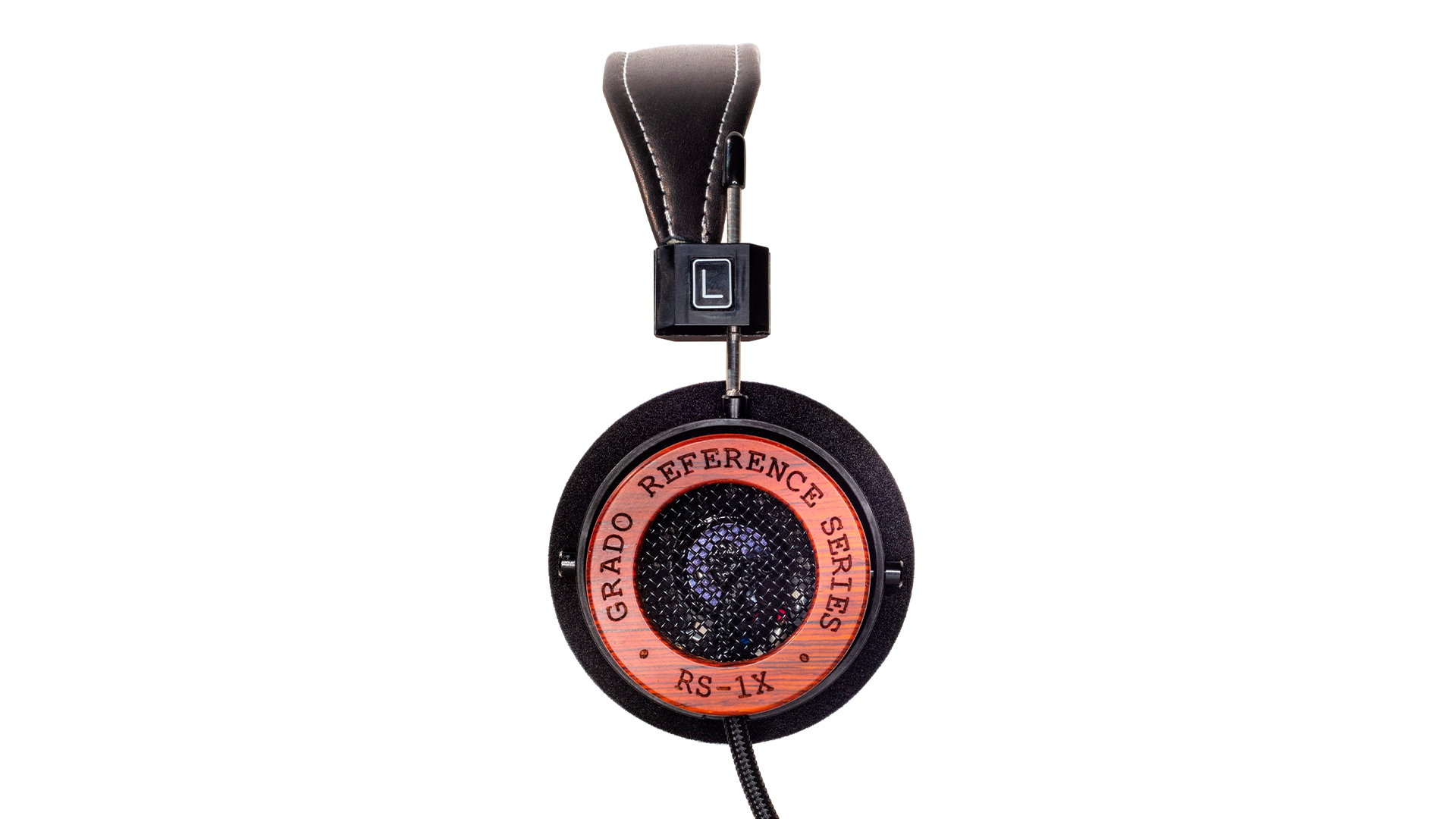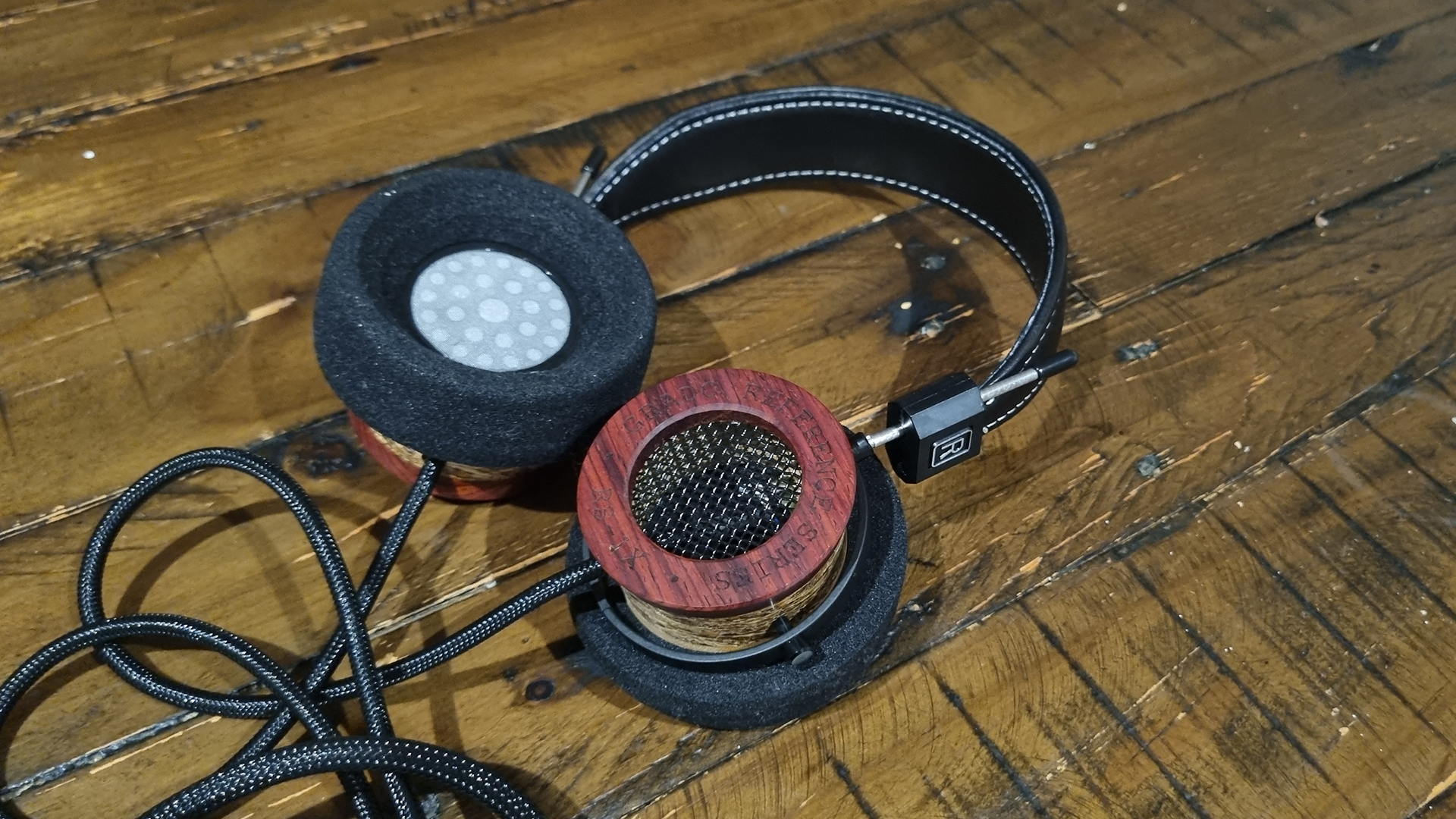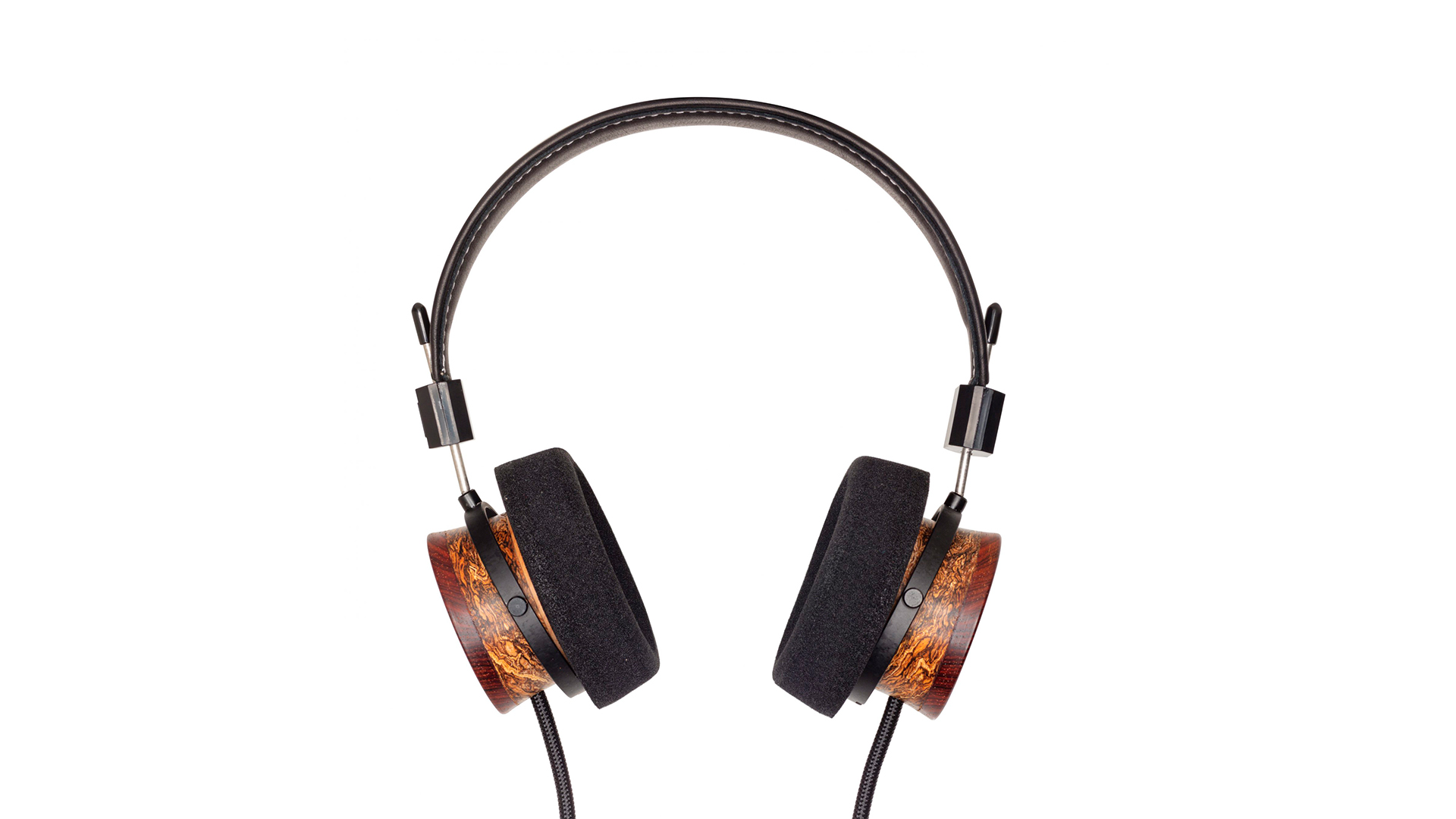What Hi-Fi? Verdict
Four generations in, the top Reference Series model is more entertaining (and exotic) than ever before
Pros
- +
Clean, clear and punchy performers
- +
Dynamically gifted
- +
Naturally musical
Cons
- -
Leaky open-back design not always practical
Why you can trust What Hi-Fi?
Grado’s relationship with wood is as unequivocal, if not as famous, as Lego’s with plastic. The Brooklyn-based, family-owned brand was only a year into hand-building its first headphones when, as the story goes, John Grado (son of the company’s founder, Joseph) woke up one night with the idea of creating a wooden pair and went downstairs to start carving out what would become the RS1.
That inspired further Grado wood creations in the mid-’90s, including Reference Series cartridges, still-unreleased stereo speakers, and even a stereo amplifier that was housed in a single block of wood. Today, just under half of Grado’s models in its wired-open-back headphone line-up are aestheticlly defined by those familiar circular wooden earcups. And even some of those that don't have wood at the heart of their DNA: the company’s range-topping chrome-finished PS500e and PS2000e, for example, have chamber cores made from mahogany and maple respectively. Grado has always been fond of the warm tonal character that it brings, and we have to say, that proclivity hasn’t served the company half bad over the decades.
More than 30 years after the first wooden Grado creation, the fourth generation of that very model enters our test rooms. Say hello to the RS1x. And yes, folks, it’s very woody.
Design

So woody, in fact, that the RS1x are the brand’s first ‘tri-wood’ pair, meaning, of course, that they are the first to use three different wood species – specifically, maple sleeve, hemp core and cocobolo. It’s an exotic combination you’d more likely expect to see listed in a West Elm catalogue than on a headphones listing.
Think what you like about wood in hi-fi – that it looks old-fashioned, that it has a distinctly warm sonic signature, that it’s all you’d ever consider – its application here is aesthetically, let alone sonically, wonderful. The mix of dark-and light-coloured woods on the open-back earcups offers a contrast that’s not only striking but also brings a touch of the contemporary to the heritage Grado design, which is still defined by circular foam earpads, antennae-resembling adjustment sliders, a thin leather headband (which now has white stitched edges), and a long cable (in this instance 1.7m and with a new grippy braided jacket) that serves as an ever-present reminder that these are headphones designed first and foremost to be used at home. Just like the 6.3mm jack adapter you’ll find in the box.
Aside from some of Grado’s special/limited-edition models that have appeared over the years (the uninitiated might like to give the Gold SR325 and James Taylor variants a quick Google), the RS1x is probably its most domestic-friendly pair yet.

Type Open-back
Frequency Response 12 - 30,000hz
Nominal Impedance 38 ohms
Cable 1.7m, 3.5mm (6.3mm adapter supplied)
The build still wears that hand-made feel, too, which isn’t to say that it looks or feels cheap but that it doesn’t particularly look or feel machined. Grado has been in the game long enough to know what it and presumably its customers like – tactile, no-nonsense design and lightweight comfort – and within that brief, the RS1x don’t disappoint.
It’s only right that a fourth-generation model gets a fourth-generation driver. Grado’s ‘X Drivers’ debuted in the Prestige Series to which the 2021 What Hi-Fi? Award-winning SR325x and SR80x belong, and are implemented for the first time in 50mm size here. Grado says that they have been specifically tuned for the wooden enclosures they sit in and bring a "completely redesigned speaker and new harmony" to the headphones.
Just at the edge of the spotlight shining on the new drivers is a more powerful magnetic circuit, a voice coil with decreased effective mass, and a reconfigured diaphragm.
We should say that the RS1x is not a standalone model but part of a two-strong Reference Series, with the slightly more affordable RS2x (£599.95 / $550 / AU$749) combining 44mm ‘X Drivers’ with maple and hemp wood. We can’t comment on the performance that particular partnership brings here, but we can tell you quite a lot about the sound quality delivered by the RS1x’s 50mm driver and tri-wood enclosure.
Sound

Anyone who has ever heard a pair of Grado headphones, whether that was two years ago or 20, or who has just read a number of reviews of them, won’t be surprised to read that the RS1x’s performance can be characterised as distinctly open, entertainingly lean and agile, and unfalteringly detailed. Grado has carved out a solid sonic signature over the years and stayed unwaveringly loyal to it, but while the flavour has largely stayed the same, the quality level has rightfully moved on with every generation.
We dig out a pair of first-generation RS1 and, as expected, are treated to an open, forward and insightful sound. Switch to the new RS1x, however, and the presentation is not only clearer and notably more transparent but also faster and livelier, making the veteran pair sound somewhat ponderous in comparison. The extent of the RS1x’s fleet-footedness has us drawing similar comparisons with rivals such as the Beyerydnamic T1 (3rd Generation), even if they chalk up points for their greater solidity, refinement and deeper bass. We commented on the new driver’s punchy nature in our SR325x review, and that talent certainly manifests in these Reference Series headphones too.
It’s true what is written inside the RS1x’s box: the headphones need some time to run in to calm down their out-of-the-box leanness, and we found that four evenings of playback was enough for our sample to shed some of that unwanted crudeness.
Speaking of crude, we tee up Eminem’s Killshot and his biting delivery sounds as impassioned as we’ve heard it out of two earcups. The RS1x is so clear and direct it feels as through he’s telling us off, and yet there’s enough detail and dynamic insight, and then some, to prevent his expression ever sounding unduly shouty.
Khachaturian’s Sabre Dance is a classical masterpiece that also allows the Grados to show off their precise, fast and dynamic nature. The great number of instruments in the dense composition – from the xylophone, bells and marimba to the snare drums and crash cymbals – are well pin-pointed in the soundstage, and the RS1x’s detail and dexterity does justice to the varying frequency-spanning textures and maddening pace that make the composition so enthralling.
That the RS1x are dynamically gifted isn’t a surprise considering their open-back design, which is also why you won’t get as much bass depth as closed-back models typically offer. What acceptable levels of bass you do get, though, are textured and delivered with the same pleasing agility as the rest of the frequency range.
Going up in Grado’s range rewards you with greater subtlety and refinement, but the X Drivers have bridged the gap somewhat and we’re very fond of their exceptional clarity and fleet-footed musicality. We do actually find that you can make small gains in refinement and get slightly more bass presence by swapping the RS1x’s sponge on-ear earpads with the larger ‘over-ear’ versions that are supplied with the Statement Series but also available to purchase separately – a small upgrade, in our minds, but arguably worth it for the modest extra outlay.
Verdict

Larger earpads or not though, the RS1x are very much up there with the most compelling pairs around at this price. As Jonathan Grado – John Grado’s son and vice president of the company – said upon the headphones’ release, “it’s kind of extraordinary that this middle-of-the-night idea is now evolving into an even greater headphone 27 years later”. Grado’s love affair with wood and headphones is still going strong and, as the RS1x attest to, remains just as relevant today in the home headphones market.
SCORES
- Sound 5
- Build 5
- Compatibility 4
MORE:
Read our review of the Beyerydnamic T1 (3rd Gen)
Also consider the Focal Clear Mg
Best over-ear headphones: wired and wireless over-ears for all budgets
What Hi-Fi?, founded in 1976, is the world's leading independent guide to buying and owning hi-fi and home entertainment products. Our comprehensive tests help you buy the very best for your money, with our advice sections giving you step-by-step information on how to get even more from your music and movies. Everything is tested by our dedicated team of in-house reviewers in our custom-built test rooms in London, Reading and Bath. Our coveted five-star rating and Awards are recognised all over the world as the ultimate seal of approval, so you can buy with absolute confidence.
-
Gray Certainly don't look like £800 worth.Reply
You can see that they'd leave much to be desired in terms of comfort too.
Would need to sound unbelievably good. -
kdbur Reply
What HiFi rave over Grado al the time and it is so over the top it looks suspicious to me...Gray said:Certainly don't look like £800 worth.
You can see that they'd leave much to be desired in terms of comfort too.
Would need to sound unbelievably good. -
Valkyr09 Reply
Accusation of payola deleted.kdbur said:What HiFi rave over Grado al the time and it is so over the top it looks suspicious to me...


